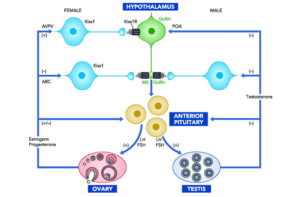Looking for a way to boost your fertility and hormones? Meet Kisspeptin 10 peptide! This amazing peptide is key to reproductive health and hormonal balance. It can help with puberty, ovulation, and even fertility issues. Plus, it works for both men and women.
In this article, we’ll cover everything about Kisspeptin. You’ll learn about its benefits, possible side effects, and the proper dosage for men and women. We’ll also guide you on how to buy kisspeptin online safely.
For the best and purest peptides, trust NuScience Peptides—your go-to source for high-quality products.
Let’s start by understanding the Kisspeptin 10 peptide and how it works.
Part 1. What is Kisspeptin 10 Peptide?
Kisspeptin comes from the KISS1 gene. It is first produced as a large protein called prepro-kisspeptin. This is then broken down into smaller peptides, including Kisspeptin-54 and Kisspeptin-10.
Kisspeptin-10
Kisspeptin-10 is one of the active forms that interacts with specific receptors in the brain. These receptors are called G-protein-coupled receptor 54 (GPR54) or Kiss1r.
(Clarke et al.2015) (De Bond et al.2014)
It is a neuropeptide that plays a key role in fertility. It works by stimulating gonadotropin-releasing hormone (GnRH) neurons in the brain. GnRH is essential for starting and regulating the process of reproduction. Without it, the body cannot produce the hormones needed for fertility. (De Bond et al.2014)
Kisspeptin-10 has been studied for its role in
- Regulating hormones
- Supporting reproduction
- Gonadotrophin secretion
- Connecting signals in the brain and reproductive organs.
(d’Anglemont et al.2010) (Clarke et al.2015)

Kisspeptin peptide as an upstream regulator
Next, let’s discover the benefits of kisspeptin in great detail.
Part 2. Benefits of Kisspeptin Peptide
Kisspeptin is a key neuropeptide that supports reproductive health. It connects the brain to reproductive organs and helps regulate hormones. Researchers have found many benefits of Kisspeptin for both men and women.
Let’s take a closer look at these benefits.
1. Supports Hormonal Balance
Kisspeptin ensures that the hormones responsible for reproduction are in sync. It stimulates the release of gonadotropin-releasing hormone (GnRH), vital for producing luteinizing and follicle-stimulating hormones. These hormones play a major role in ovulation and sperm production.
Research shows that
- Kisspeptin neurons in the brain help maintain feedback loops with sex hormones.
For example, estrogen and testosterone levels directly influence kisspeptin activity. When levels drop, kisspeptin activates GnRH neurons to boost hormone production. This balance helps prevent hormonal disorders in women and men.
2. Promotes Puberty Onset and Development
Kisspeptin is essential for the start of puberty. It activates the hypothalamic-pituitary-gonadal (HPG) axis, leading to physical and hormonal changes. Without adequate kisspeptin signaling, puberty may be delayed or fail to occur.
Studies highlight that mutations in the Kiss1 gene or Kiss1r receptor can result in conditions like hypogonadotropic hypogonadism. This condition is marked by delayed puberty and infertility.
Kisspeptin therapies are being explored to address such issues, offering hope for individuals with puberty-related hormonal disorders.

Feedback Mechanism on Kisspeptin neurons by ovarian steroids
3. Role in Female Reproductive Health
The Kisspeptin/KISS1R system plays an indispensable role in female reproductive health. It influences key processes like
- Follicular development
- Oocyte maturation
- Ovulation
These functions stem from regulating the hypothalamic–pituitary–ovarian (HPO) axis and its direct actions within the ovary.
Let’s explore these functions one by one.

Kisspeptin expression and effectiveness on ovarian cells
Follicular Development
Kisspeptin regulates ovarian follicular development at various stages. Research has revealed that.
- Kisspeptin downregulates FSHR expression, thereby suppressing initial follicular recruitment.
- It increases anti-Müllerian hormone (AMH) levels, inhibiting primordial follicle activation.
- Kisspeptin negatively regulates preantral and small antral follicles while it promotes the maturation of large antral follicles.
- It also increases the number of preovulatory follicles and corpus luteal by mediating luteinizing hormone (LH) signals. This effect highlights its role in preparing the ovary for ovulation.
Oocyte Maturation
Kisspeptin, particularly kisspeptin-54, has been found to cause oocyte maturation effectively. Crossing the blood-brain barrier stimulates LH release, enhancing oocyte maturation in preparation for fertilization.
Clinical applications of this function make kisspeptin an invaluable tool in assisted reproductive technologies (ART).
Ovulation
Kisspeptin facilitates the LH increase needed to release a mature egg from the ovary during ovulation. This makes it a critical hormone for achieving successful ovulation, particularly in individuals undergoing fertility.
4. Beyond Reproduction: A Lesser-Known Benefit
While Kisspeptin is famous for its role in reproduction, it may also help regulate stress responses.
Recent studies suggest that
- Kisspeptin signaling interacts with stress pathways in the brain.
- This interaction could potentially make it helpful in managing conditions like anxiety or stress-related disorders in the future.
Wondering about Kisspeptin dosage? Learn the proper Kisspeptin-10 dosage for men and women next.
Part 3. Kisspeptin Dosage for Men and Women
Kisspeptin-10 dosage varies depending on its purpose, such as improving fertility or regulating hormones. Current research provides limited information about specific human dosage guidelines. Most available data come from animal studies, highlighting how dosage influences reproductive hormones and gonadal development.
Kisspeptin-10 Dosage for Men
Research suggests that kisspeptin-10 in male animals can affect
- Testosterone levels
- Testicular development
In a study, prepubertal male rats were given intraperitoneal doses of 1 µg, 1 ng, and 10 pg twice daily. Higher doses (1 µg and 1 ng) reduced testosterone levels and caused testicular degeneration. However, the lowest dose (10 pg) showed no significant adverse effects.
This indicates that dosage is crucial, and higher amounts may harm reproductive health.
Kisspeptin Dosage for Women
Kisspeptin plays an essential role in regulating ovulation and hormone balance. Clinical studies may explore its use in assisted reproduction, but no clear guidelines are currently available.
It’s essential to consult a doctor before using kisspeptin for hormone therapy or fertility treatments.
Are there any risks? Let’s explore the possible Kisspeptin side effects you need to know.
Part 4. Kisspeptin Side Effects: What You Need to Know
While kisspeptin peptides are known for their promising role in reproductive health, they may cause side effects in some cases. Before considering their use, it is important to be informed about these potential disadvantages.
Below, we discuss the key side effects associated with the kisspeptin-10 peptide.
Possible Side Effects of Kisspeptin-10 Peptide
Here are some of the side effects reported from different studies.
- Mild Nausea or Headaches
Some users may experience nausea or headaches, especially after their first doses. These symptoms are usually temporary and go away as the body adjusts.
- Impact on Blood Sugar Levels
Animal studies indicate that Kisspeptin may affect glucose-stimulated insulin secretion, altering blood glucose homeostasis. However, the evidence is not well established in humans.
- Hormonal Imbalances at High Doses
Research has shown that high doses of Kisspeptin may overstimulate hormone production, leading to imbalances. Therefore, dosage must be monitored carefully to avoid this risk.
- Effects on Blood Vessels
Kisspeptin may cause vasoconstriction, which tightens blood vessels and impacts circulation. While this has been observed in lab studies, more research is needed to confirm its effects in humans.
- Unknown Long-Term Effects
Since studies are still ongoing, the long-term effects of kisspeptin use are not fully understood. Users should exercise caution and consult healthcare professionals before starting treatment.
Always seek medical advice before using kisspeptin to ensure safety and effectiveness.
Next, let’s explore how to buy kisspeptin online safely.
Part 5. How to Get Kisspeptin Online
You have to be careful in buying Kisspeptin online. Select a seller whom you trust, as they would sell you good products.
Here are some tips for buying Kisspeptin safely:
- Verify Product Purity
It should have lab-tested products with a certificate of analysis; this guarantees that the product is pure and safe to use.
- Secure Payment Options
Always buy from websites that offer secure payment methods to protect your information.
- Customer Support
Opt for sellers that provide responsive and helpful customer service.
Let’s now discover the best source to obtain this peptide.
Buy Kisspeptin Online from NuScience Peptides
Regarding trusted sources, NuScience Peptides stands out as a reliable option for buying Kisspeptin online. Let’s explore the features that make NuScience Peptides a preferred choice.
Features of NuScience Peptides
Here are some of the benefits that NuScience Peptides offers its customers.
- Same-Day Shipping
NuScience Peptides ensures fast delivery. Orders placed before 12:00 pm EST are shipped the same day, so you don’t have to wait long.
- Dedicated Customer Service
Their customer service team is always ready to assist. Whether you have questions or need help with your order, they prioritize your satisfaction.
- Free Shipping on Large Orders
Enjoy free shipping on orders over $200. This feature makes bulk purchases convenient and cost-effective.
- High Purity Products
NuScience Peptides takes pride in providing the purest products. Every item undergoes rigorous lab testing to guarantee top-notch quality.

Kisspeptin Peptide from NuScience Peptides
In short, by choosing NuScience Peptides, you can access high-quality Kisspeptin products and excellent customer support.
Conclusion
Kisspeptin 10 peptide is vital in supporting reproductive health and hormonal balance. It offers potential benefits for both men and women, from aiding puberty onset to improving ovulation and fertility. However, using this peptide carefully and consulting a doctor before starting treatment is essential.
If you’re ready to explore the benefits of Kisspeptin, buy high-quality Kisspeptin online from NuScience Peptides today.
Don’t wait—take the next step toward better health now!
DISCLAIMER
The information in this article is for educational purposes only. It is not medical advice or a substitute for professional consultation.
Always consult a qualified healthcare provider before using any peptides or starting a new treatment. This is especially important if you have a medical condition or take other medications.
We do not guarantee the accuracy or completeness of the information provided. Research on Kisspeptin peptides is ongoing, and findings may change over time.
We are not responsible for side effects, misuse, or outcomes from using Kisspeptin peptides. Use them at your own risk, and you agree to this disclaimer by reading this article.
References
Calley, J. L., & Dhillo, W. S. (2014). Effects of the hormone kisspeptin on reproductive hormone release in humans. Advances in Biology, 2014(1). https://doi.org/10.1155/2014/512650
Clarke, H., Dhillo, W. S., & Jayasena, C. N. (2015). KoreaMed synapse. Endocrinology and Metabolism, 30(2), 124–141. https://doi.org/10.3803/EnM.2015.30.2.124
d’Anglemont de Tassigny, X., & Colledge, W. H. (2010). The role of kisspeptin signaling in reproduction. Physiology, 25(4), 207–217. https://doi.org/10.1152/physiol.00009.2010
De Bond, J.-A. P., & Smith, J. T. (2014). Kisspeptin and energy balance in reproduction. REPRODUCTION, 147(3), R53–R63. https://doi.org/10.1530/rep-13-0509
Hu, K.-L., Zhao, H., Chang, H.-M., Yu, Y., & Qiao, J. (2018). Frontiers. Frontiers in Endocrinology, 8. https://doi.org/10.3389/fendo.2017.00365
Oakley, A. E., Clifton, D. K., & Steiner, R. A. (2009). Kisspeptin signaling in the brain. Endocrine Reviews, 30(6), 713–743. https://doi.org/10.1210/er.2009-0005
Ramzan, F. (2011). Intraperitoneal kisspeptin-10 administration induces dose-dependent degenerative changes in maturing rat testes. Life Sciences, 88(5–6), 246–256. https://doi.org/10.1016/j.lfs.2010.11.019
Roseweir, A. K., & Millar, R. P. (2008). The role of kisspeptin in the control of gonadotrophin secretion. Human Reproduction Update, 15(2), 203–212. https://doi.org/10.1093/humupd/dmn058


